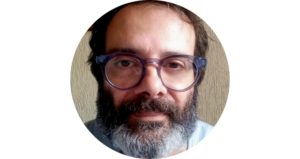
Period of Residence: March 6, 2023 to December 22, 2023
Department of Philosophy – FAFICH / UFMG
Walter Romero Menon Junior is an Adjunct Professor at the Department of Philosophy at UFMG. Line of research CNPQ: Contemporary Philosophy; Aesthetics. Areas of interest: Aesthetics, Philosophy of Art, Philosophy of Technique, with emphasis on the relationship between aesthetics, philosophy of language, philosophy of technique, theory of knowledge. Interesting authors: Danto, Goodman, Kant, Schiller, A. Leroi-Gourhan, G. Simondon, J. Poulain. Postdoc under the supervision of Bernadette Bensaude-Vincent in 2015 at CETCOPRA,CENTRE DETUDE DES TECHNIQUES DES CONNAISSANCES ET DES PRATIQUES Université Paris 1 Panthéon-Sorbonne Directeur : M. Alain GRAS. PhD in philosophy from the Paris VIII University under the supervision of Jacques Poulain. Author for lHarmattan publishing house of the book lOeuvre dArt, lExpérience esthétique de la Vérité, 2010.
Philosophy subproject coordinator at PIBID-UFPR 2012-2013. Coordinator of Nectec, Nucleus of Studies on Technical Culture, Department of Philosophy, UFPR. Member of NAVIS, Nucleus of Visual Arts – Department of History, UFPR. Member of the SPECIES group at the Federal University of Paraná. Philosophy subproject coordinator PIBID UFMG 2021. Coordinator of the PPG-Filosofia UFMG 2022-2023 Since 1998 he works as a visual artist.
KANT AND THE SPECTRAS. METAPHYSICS, DREAMS AND FICTION IN THE ORIGINS OF THE CULTURAL INDUSTRY
This project aims to present in general lines the development of the theory of spirits undertaken by Kant in the text The dreams of a visionary explained by the dreams of metaphysics, published in 1766, with its epistemic and socio-anthropological consequences. The starting point is the optical scheme that Kant uses to explain the phenomena of communication with spirits and its relationship with the same scheme of visual perception, as well as the spectral projection devices used in spiritist shows and seances.
Our hypothesis is that the Kantian text is part, due to its style and theme, of the wave of publications about visionaries, apparitions and ghostly shows, which gained volume from the last decades of the eighteenth century and became an epidemic in the following century, starting to what later Adorno and Horkheimer would call the cultural industry. Furthermore, in view of the centrality that the oneiric regime has for capitalist realism in Mike Fischer’s terms, it is no less likely that this will give the structural continuity of the Kantian scheme and its spectral consequences. Thus, our ultimate goal, in addition to confronting this collective dreamlike regime, is to investigate other possibilities for sharing dreams and their direct relationship with society, territoriality and temporality regimes in non-Western societies, as an alternative to the model of capitalist realism.